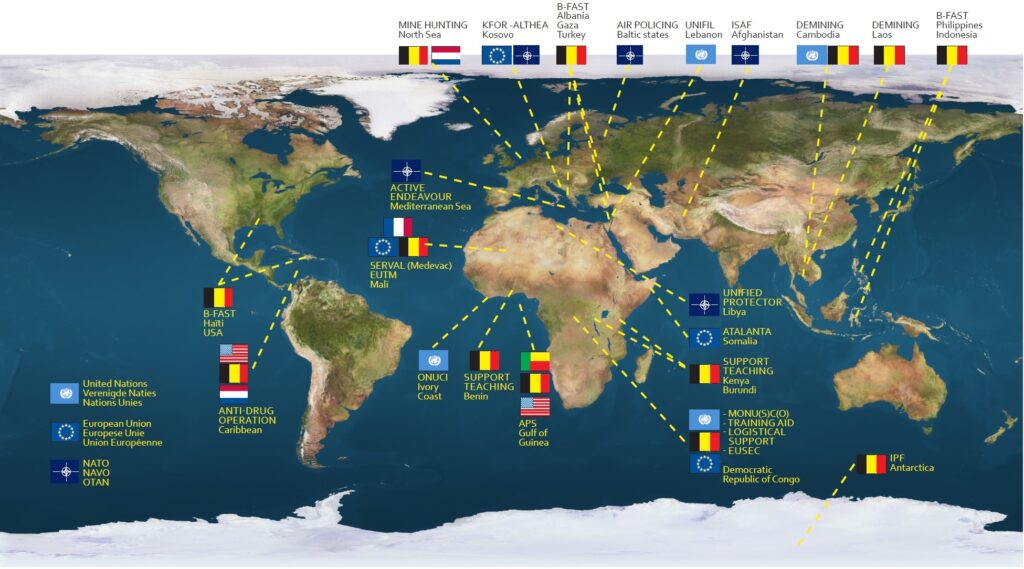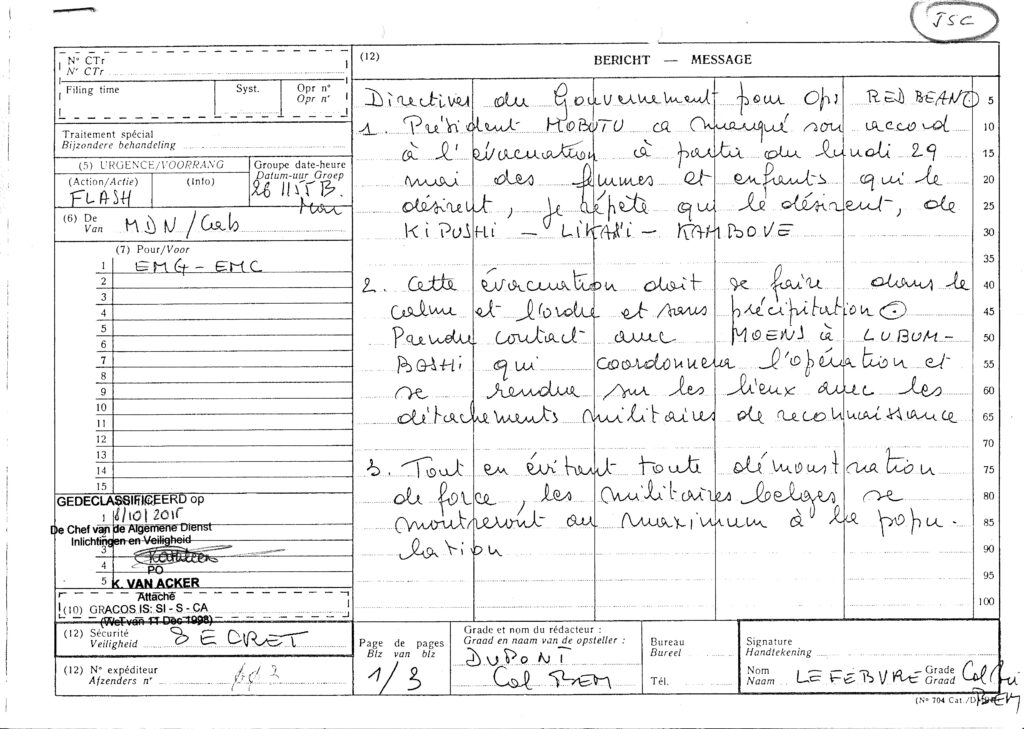| Previous page | Back to exhibition’s homepage | Next page |
| Contents: 1. Introduction 2. Central Africa 3. Afghanistan |
Introduction | Introduction | Inleiding |
| Le SGRS est impliqué dans chaque phase d’une potentielle opération réalisée par les composantes Terre, Mer, Air ou Médicale. | The SGRS is involved in each step of a potential operation conducted by the Land, Sea, Air or Medical Force. | In elke fase van een mogelijke operatie door grondtroepen, marine, luchtmacht of medische ploegen, is ADIV betrokken. |
| Nous pouvons distinguer différentes étapes dans lesquelles le SGRS joue un rôle : | The SGRS plays a role at several levels: | We onderscheiden verschillende fasen waarin ADIV een rol speelt: |
- La surveillance de zones à risque potentielles : les informations collectées sont traduites en études, et des briefings sont donnés à l’État-major et à d’autres intéressés.
- La préparation du processus de décision politico-militaire : les analystes fournissent des études pour les différents cabinets ministériels.
- La préparation des déploiements : en fonction des zones, les réseaux de contacts et de renseignement sont activés, et des agents sont envoyés sur le terrain.
- Le planning des opérations : une fois le cadre stratégique établi, les détachements reçoivent le plus d’informations possible, les cadres sont informés des conditions de sécurité, les divers systèmes de défense électroniques sont programmés…
- La réalisation des opérations : les détachements reçoivent en permanence des renseignements tactiques et opérationnels, et la sécurité intérieure et les menaces extérieures font l’objet d’une attention particulière. Les équipes restées en Belgique sont tenues informées de la situation.
- Le bouclage des opérations : la fin d’une opération recèle toujours une multitude de risques. Dès lors, le personnel du SGRS reste sur place jusqu’aux derniers instants et garde une vigilance maximale.
- Le bilan : l’opération est évaluée phase après phase afin de travailler plus efficacement à l’avenir et d’éviter certains risques.
- Monitoring of potential risk areas: the collected information is transformed in studies, and the General Staff and other stakeholders are provided with briefings.
- Preparation of the politico-military decision-making process: the analysts provide the ministerial cabinets with studies.
- Preparation of deployments: where possible, the contacts and intelligence networks are activated, and agents are sent on site.
- Planning of operations: once the strategic framework is established, the detachments are supplied with as much information as possible, leading officers are briefed on the security environment, the many electronic defence systems are programmed…
- Execution of operations: the detachments receive continuous tactical and operational information, and particular attention is paid to internal security and external threats. The home front is kept informed of the situation
- End of operations: the end of an operation always comes with numerous risks. The SGRS personnel therefore stay alert and are present until the very last moments.
- Lessons learned: a phase-by-phase evaluation of the operation is made in order to work more efficiently in the future and avoid risks.
- De monitoring van mogelijke risicogebieden: de informatie hierover wordt vertaald in studies en er worden briefings gegeven aan de Generale Staf en andere geïnteresseerden.
- De voorbereiding van het politiek-militaire besluitvormingsproces: de analisten leveren een studie af voor de verschillende ministeriële kabinetten.
- De voorbereiding van de ontplooiing: waar mogelijk worden de contacten en inlichtingennetwerken geactiveerd, er worden ook inlichtingenagenten ter plaatse gestuurd.
- De planning van de operatie: eens het strategisch kader is bepaald, wordt er zoveel mogelijk informatie aan de detachementen gegeven, de kaders worden ingelicht over de veiligheidsomgeving, de diverse elektronische verdedigingssystemen worden geprogrammeerd…
- De uitvoering van de operatie: de detachementen krijgen permanent tactische en operationele inlichtingen, er wordt aandacht besteed aan de inwendige veiligheid en de dreigingen van buiten uit. Het thuisfront wordt op de hoogte gehouden.
- Afsluiten van de operatie: het einde van een operatie is steeds een risicovol moment, zodat het ADIV personeel tot het laatste ogenblik ter plaatse is en alert blijft.
- Lessons learned: de operatie wordt fase per fase geëvalueerd om zo in de toekomst efficiënter te kunnen werken en risico’s te vermijden.
Afrique Centrale | Central Africa | Midden-Afrika |
| Après l’indépendance du Congo belge (30 juin 1960) et du Ruanda-Urundi (1 juillet 1962), ce qui a entraîné la dissolution de la Force publique, la Belgique ne dispose plus d’une organisation sur place, responsable pour le renseignement et la sécurité militaires. | After the independence of the Belgian Congo (30th June 1960) and Ruanda-Urundi (1st July 1962), which led to the dissolution of the Force publique, Belgium no longer possessed a local service responsible for the management of military intelligence and security. | Na de onafhankelijkheid van Belgisch Kongo (30 juni 1960) en Ruanda-Urundi (1 juli 1962), met als gevolg de ontbinding van de Openbare Weermacht, beschikt België niet langer over een organisatie, ter plaatse belast met militaire inlichtingen en veiligheid. |
Après 1962, telles sont les priorités de la Belgique pour l’Afrique centrale :
| After 1962, the priorities of Belgium with regard to Central Africa were the following:
| Na 1962 heeft België de volgende prioriteiten voor wat betreft Midden-Afrika:
|
| Le Service général du Renseignement se voit confier un rôle important, puisqu’il doit transmettre régulièrement aux autorités compétentes les informations collectées, tant sur le plan stratégique/opérationnel que sur le plan opérationnel/tactique. Ces informations, ainsi qu’une présence permanente sur le terrain, permettent de conduire, depuis la Belgique, un certain nombre d’opérations de sauvetage armées et de participer à des opérations internationales de maintien de la paix. | The Service général du Renseignement was entrusted with a major role, i.e. providing the competent authorities with regular information pertaining to both the strategic/operational and the operational/tactical level. Thanks to this information and the permanent presence on site, it was possible to conduct several armed rescue operations from Belgium and to participate in international peacekeeping operations. | Een belangrijke rol is weggelegd voor de Algemene Dienst Inlichting die regelmatig de door haar verzamelde gegevens, zowel van strategisch-operationele als van operationeel-tactische aard, ter beschikking stelt van de bevoegde autoriteiten. Dankzij deze informatie, en door het permanent aanwezig zijn op het terrein, is het mogelijk om vanuit België een aantal gewapende reddingsoperaties uit te voeren en om op een betekenisvolle wijze te kunnen deelnemen aan internationale operaties in het domein van ordehandhaving. |
| En outre, le Service général du Renseignement assiste les militaires belges sur place lors de missions d’appui technique ou de formation de cadres militaires. | Moreover, the Service général du Renseignement also helped Belgian soldiers during operations implying technical assistance and training of military leading personnel. | Daarnaast biedt de Algemene Dienst Inlichting steun aan de Belgische militairen ter plaatse tijdens het verlenen van technische bijstand en het opleiden van militaire kaders. |
Afghanistan | Afghanistan | Afghanistan |
| À la suite des attentats du 11 septembre 2001, la conférence de Bonn décide en décembre de la même année de mettre en place un gouvernement intérimaire en Afghanistan et de mettre sur pied une nouvelle armée afghane. Fin décembre, le gouvernement belge donne son feu vert pour que la Défense participe à l’International Security Assistance Force (ISAF). | In the aftermath of 9/11, the Bonn conference decided in December 2001 to install an Afghan interim government and to raise a new Afghan army. End December, the Belgian government gave the green light to the Defence to participate in the International Security Assistance Force (ISAF). | Na de aanslagen van 11 september 2001 wordt tijdens de Bonn conferentie in december 2001 beslist een Afghaanse Interim regering in plaats te stellen en een nieuw Afghaans leger op te richten. Op het einde van diezelfde maand geeft de Belgische regering groen licht aan Defensie om deel te nemen aan de International Security Assistance Force (ISAF). |
| Fin 2002, le SGRS installe une National Intelligence Cell (NIC) à Kaboul. Cette cellule est notamment responsable de la collecte de toutes sortes de renseignements concernant la sécurité sur et autour de l’aéroport de Kaboul. À cet effet, la NIC collabore avec des sources et évalue le risque d’une potentielle attaque (quand, par qui, contre qui, comment). | End 2002, the SGRS established a National Intelligence Cell (NIC) in Kabul. This cell was responsible a.o. for the collection of intelligence regarding security in and around Kabul airport. To do so, the NIC worked with sources and investigated the risk of potential attacks (when, by whom, against whom, how). | ADIV installeert einde 2002 een National Intelligence Cell (NIC) te Kaboel. Deze cel is o.a. verantwoordelijk voor het verzamelen van alle soorten inlichtingen betreffende de veiligheid op en rond de luchthaven van Kaboel. Daarvoor doet de NIC aan bronwerking en onderzoekt ze het gevaar op een mogelijke aanslag (wanneer, door wie, waartegen, waarmee). |
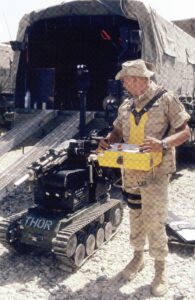 | 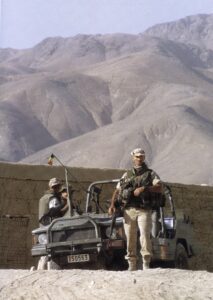 | 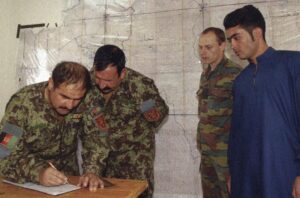 |
| Ainsi, la NIC fournit des renseignements sur les missiles qui ciblent l’aéroport depuis l’est et le nord de Kaboul. Ces renseignements ont trait au lieu d’assemblage des missiles et aux auteurs des attaques. À la lumière de ces renseignements, il est possible de prendre des mesures de protection et de réfléchir aux moyens d’écarter la menace. | For instance, the NIC provided intelligence on rockets fired on the airport from the eastern and northern part of Kabul. Intelligence concerned the assembly facilities of the rockets and the perpetrators of the attacks. This intelligence made it possible to adopt protective measures and to search ways to erase the threat. | Zo levert de NIC bijvoorbeeld inlichtingen over de raketten die vanuit het Oosten en Noorden van Kaboel op de luchthaven worden afgevuurd. Deze inlichtingen betreffen de plaats waar de raketten zijn opgesteld en door wie ze worden afgevuurd. Aan de hand van deze inlichtingen neemt men beschermende maatregelen en bekijkt men hoe de dreiging kan worden uitgeschakeld. |
| Le SGRS est chargé de la protection des personnes déployées au QG de l’ISAF et fournit des renseignements aux diplomates belges en poste à Kaboul. | The SGRS was responsible for protecting the persons deployed in the ISAF HQ and providing Belgian diplomats in Kabul with intelligence. | ADIV zorgt ook voor de beveiliging van de mensen die ontplooid zijn op het ISAF Hoofdkwartier en verstrekt inlichtingen aan Belgische diplomaten in Kaboel. |
| Previous page | Back to exhibition’s homepage | Next page |
